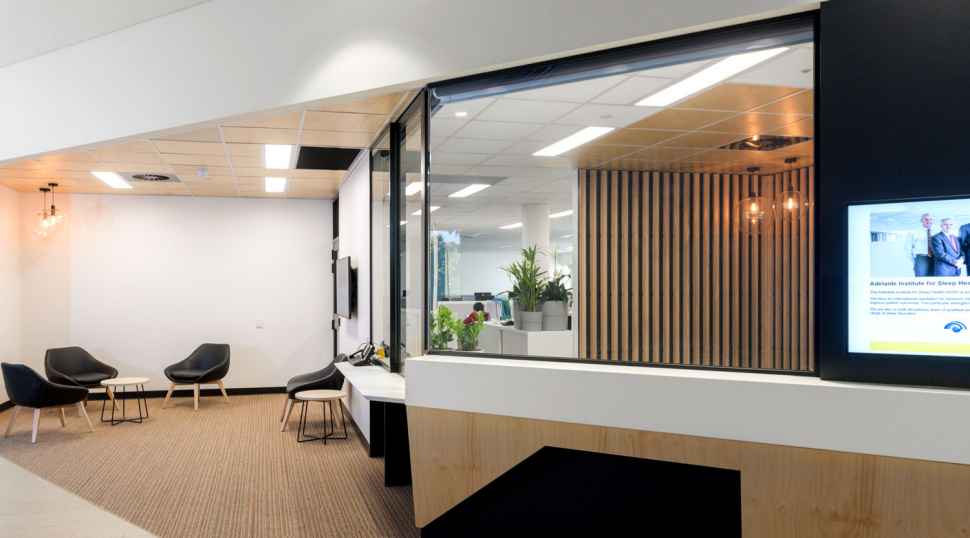FHMRI
SLEEP HEALTH
We conduct world-class research and teaching to improve health through the science of sleep.
Flinder's FHMRI Sleep Health team and the Adelaide Institute for Sleep Health (AISH) clinic are conducting world-leading transdisciplinary research to advance knowledge of sleep, sleep disorders and develop new treatments to improve sleep.
We are a transdisciplinary team comprising more than 60 health and medical professionals, students and researchers collectively combining clinical, physiology, psychology, engineering and epidemiology expertise. We also have external expert and consumer advisory groups that provide well-developed links to internationally-based Universities, industry partners, professional societies and representatives of those who matter most: patients and the community.
We are ideally placed to design and translate novel and practical diagnostic and treatment including new personalised approaches to improve sleep in the lives of people who suffer from sleep disorders, including the two most common disorders insomnia and sleep apnea.
Australia's Sleep Revolution with Dr Michael Mosley
A collaboration between Dr Michael Mosley & Flinders University’s Sleep Health team
Australia's Sleep Revolution with Dr Michael Mosley is a new three-part TV series about the nation's sleep. It premiered in March 2024 on SBS and SBS On Demand, and examines common sleep problems and their effects on people's lives and the impact nationally and beyond.
Sleep, exercise and healthy eating are the corner stones of leading a healthy life. Missing out on sleep or having a sleep disorder that robs you of good quality sleep can have serious short- and long-term health consequences.
Poor sleep can result in memory and mood disturbance and lead to daytime sleepiness, poor concentration and accidents. In the long-term, chronic sleep deprivation may contribute to a host of health problems including obesity, diabetes and cardiovascular disease. Sleep disorders are varied and can affect anyone at any time.
If you are seeking more information about sleep health and disorders, we have useful information available for:
Sleep disorders have a huge impact on the health, productivity and safety of people around the world. The two most common disorders (obstructive sleep apnea and insomnia) alone cost Australia—by conservative estimates—over $5 billion per year.
Disturbingly, current health services and policy fail to cost-effectively manage these disorders; through over-reliance on too complex and costly sleep apnea tests, unregulated industry practices often failing to deliver good outcomes for patients, and poor treatment selection and access in primary care. You can help or be involved:
Volunteer
We need people with and without sleep disorders to participate in our important research projects. Volunteers’ support is vital to our success.
Currently recruiting volunteers:
Whilst we have many studies with ongoing recruiting, some are highlighted below.
Narcolepsy and idiopathic hypersomnia study
Are you living with Narcolepsy Type 2 (without cataplexy) or Idiopathic Hypersomnia diagnosis, with no significant Obstructive Sleep Apnoea? You might be interested in a new clinical trial to understand the effects of the experimental medication ALKS 2680. Learn more
Illuminate Study - Expression of Interest
We're seeking people 18-35, who are experiencing low mood, not currently taking any medication, and are interested in starting antidepressant treatment. Learn more

Donate
You can help to improve sleep health and wellbeing in our community by donating to FHMRI Sleep Health. We thank you for your valuable support.
Collaborate
We offer workshops in both urban and rural areas, along with an education outreach program focusing on sleep health. We've established strong partnerships with universities, the South Australian Local Health Network, and industry groups, both locally and internationally. Contact us to learn more.
Home to excellence
Our dedicated sleep research facility is made up of approximately 900sqm of research and laboratory spaces, including a fully configurable six-bedroom, acoustically treated laboratory equipped with the latest technology to measure respiratory and brain function. There is also separate state of the art driver simulator room and virtual reality space. These rooms can be used to test for the impacts of environmental noise on sleep and conduct live-in sleep deprivation and circadian experiments.
In addition there are Sleep Health Clinic Rooms for consultations and research.
There is space to accommodate over 60 research staff. However, perhaps the most significant advantage of our facility is its ability to facilitate cross-disciplinary scientific collaborations in translational research
We are extremely proud of the combination of such cutting-edge laboratories, the latest technology, and work spaces that are home to our world-class teaching and research into respiratory and non-respiratory sleep disorders.
Our Team

Professor Eckert is a National Health and Medical Research Council of Australia Leadership Fellow and a Mathew Flinders Professor at Flinders University. He serves as Director of FHMRI Sleep Health and was the inaugural Deputy Director and Clinical Translation Theme Lead at Flinders Health and Medical Research Institute (FHMRI).
Professor Eckert leads a comprehensive basic sciences and translational research program that focuses on identification of the causes of sleep apnea, optimisation of existing therapies, and development of new tailored therapies. He is most well-known for his pioneering respiratory phenotyping work which has led to a new precision medicine therapeutic framework to understand and treat OSA and for his research on the role of arousal mechanisms on sleep apnea pathogenesis and novel pharmacotherapy. He has published more than 170 articles in the leading sleep and respiratory medicine and other cross-disciplinary and general medical journals.
His previous appointments include Professor of Medicine at the University of New South Wales in Sydney, Principal Research Scientist at Neuroscience Research Australia where he maintains affiliate appointments, and Assistant Professor within the Division of Sleep Medicine, Brigham and Women’s Hospital, Harvard Medical School, Boston.

Professor Robert Adams is respiratory and sleep physician based at Flinders Medical Centre and is Medical Director of the Adelaide Institute for Sleep Health (AISH) at Flinders University. His multidisciplinary, translational research examines the impact of chronic conditions, particularly sleep apnea and insomnia, on health and effects of health services interventions. A current focus is examining the impact of novel technology for diagnosis and monitoring of sleep disorders such as sleep apnea and insomnia and understanding how this can help with better matching the right treatment to the right patients. With colleagues at AISH he is examining the effects of shiftwork on health and the effect of sleep and circadian disruption on health and daytime functioning. Other work examines how simple dietary changes can improve sleep.
He leads the NHMRC Centre of Research Excellence National Centre for Sleep Health Services Research, which is conducting trials of new models of care for OSA and insomnia in primary care to enhance the ability of primary care to manage sleep health. He has authored over 330 peer-reviewed publications in the leading sleep, respiratory and general medical journals. He is the Deputy Chair of the Sleep Health Foundation (SHF) the leading advocacy group for sleep health in Australia. He Chairs the Healthy Sleep in Hospital Working Group, aimed at providing the most conducive environment for sleeping in hospitals.

FHMRI Sleep Health team, 2025
We have strong collaborations with academic partners, government bodies and professional organisations. In addition, we work with a range of strategic industry partners to advance sleep health solutions.





















Get in touch to chat to us about our research or community engagement opportunities.
Find us at:
FHMRI: Sleep Health (formerly Adelaide Institute for Sleep Health, AISH)
Level 2, Building A
Mark Oliphant building
5 Laffer Drive
Bedford Park 5042 SA
We acknowledge the traditional owners, both past and present, of the various locations the centre operates on, and recognise their continued relationship and responsibility to these lands and waters.
We value the different experiences and perspectives our people bring to their work and studies. We are committed to individual and group actions to create and maintain a safe, welcoming and inclusive environment built upon respect, dignity, fairness, caring and equity for all peoples, cultures and histories.


![]()
Sturt Rd, Bedford Park
South Australia 5042
South Australia | Northern Territory
Global | Online
CRICOS Provider: 00114A TEQSA Provider ID: PRV12097 TEQSA category: Australian University










